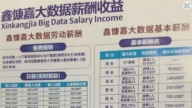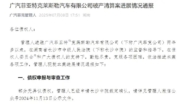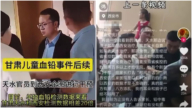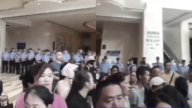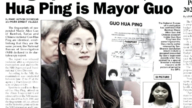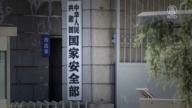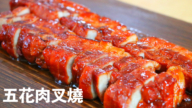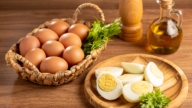【新唐人2011年2月17日讯】中共官方日前公布了最新统计数据,一月份中国居民消费价格指数(CPI)同比上涨4.9%。低于市场预测的5.3%。国家统计局调整了CPI的权重比例,专家和民众纷纷质疑,在通胀严重的形势之下,降低最近上涨最快的食品类的权重比例,是在为CPI整容,掩耳盗铃。
中共国家统计局2月15号发布的最新数据显示,1月份的居民消费价格指数为104.9,比去年12月份上涨4.9%,但低于此前5.3%的市场预期。
官方表示,这次统计采用了新的CPI权重比例,其中,居住类提高了4.22个百分点,食品类降低了2.21%。调整的重点是:提高居住类比重,降低食品类比重。官方对此解释说,这是5年一大调的常规做法。
专家和民众对这一CPI资料和调整权重的做法,纷纷表示质疑。
《东方日报》评论指出,去年国内房价大涨,房租飞快上涨,当局不调高居住类的权重;而现在食品价格飞涨,当局却降低食品类的权重。统计局明显是以技术性的手段,掩盖真实的通胀水准。
对于统计局的数据,中国安邦咨询公司的首席研究员陈功认为,如果通过国际数据进行比较的话,大致上中国的数据被低估了1/3。
网友谈到,中共官方的“统计”可以根据“政治需要” 人为的抬高或压低,以便糊弄百姓,创造“和谐社会”。
浙江的贸易商王先生对记者表示,据他的一个在统计局工作的朋友讲,统计局的数据误差高达10倍,统计局官员只是根据上级的意思去做。
王先生:“就是说,在好的数据末尾往往会添上一个零,坏的数据呢,后面往往会去掉一个零。这个数据多少不是他们能够决定的,是上面有个指标下来。”
而对于真实的通胀水准,上海的施小姐告诉记者,她实际感受到的物价上涨远远超过政府的统计数字。
施小姐:“去年我买苹果的时候,是2.8元人民币,今年最便宜的是4.8元。然后草莓,去年我可以买到4块钱的,今年普遍涨到9.8元。”
王先生谈到,对于当局这种数字游戏,《腾讯网》上的绝大多数网友认为很无聊,他自己也觉得很搞笑。
王先生:“统计局就是在那里搞恶作剧,所以我们都是一笑了之。”
北京的经济学者康先生认为,政府数据造假,老百姓越发不信任,这是当局非常大的危机。
康先生:“老百姓对于(当局)宣布的东西经常打问号,这个东西够呛!”
《华尔街日报》文章指出,看着飙升的食品价格,这样的统计结果无法让人相信,改变统计方法解决不了中国的通胀问题。
新唐人记者梁欣、李谦、朱娣采访报导。
Distorted January CPI: People’s Laughing Stock
The recently released official statistics show that
China’s Jan. CPI rose 4.9%,
lower than forecasted 5.3%.
China’s National Bureau of Statistics has adjusted
the weightings in calculating CPI.
Experts and the public have questioned that
amid serious inflation, reducing the weighting of food,
whose price is the fastest growing,
is to self-deceive by distorting the CPI.
National Bureau of Statistics’ latest released data
show, Jan. CPI was 104.9,
increased by 4.9% from Dec 2010,
but lower than the 5.3% forecasted by the market.
Officials said, new weightings are used
in the calculation.
Housing’s weighing was increased by 4.22%.
Food category’s weighting was reduced by 2.21%.
The official explanation for this adjustment is that
this is the general adjustment practice every 5 years.
Many experts and the public expressed their doubts.
Hong Kong’s Oriental Daily pointed out that in 2010,
housing prices and rents increased considerably.
The authorities didn’t increase housing’s weighting.
Now with the food prices soaring,
authorities reduced the weighting of food category.
Bureau of Statistics is using technical means to
hide the real level of inflation.
Regarding the official statistics, Chen Gong,
Chinese consulting firm Anbound’s chief researcher,
believes that by comparing with international stats,
the Chinese data have been underestimated by 1/3.
Netizes said, China’s official statistics can be
artificially inflated or reduced for “political needs,"
to fool the people and create a “harmonious society."
Mr. Wang, a trader from Zhejiang, told reporters,
according to his friend working in the Bureau of Stats,
the data are 10 times different from the real figures.
The bureau officials only do as per orders from the top.
Wang: Useful data are often added an extra 0
at the end.
They would drop one 0 at the end of unflattering data.
The data were not determined by the bureau officials.
They have to do according to a quota set by the top.
Miss Shi from Shanghai told reporters,
she feels the price increases are far more greater
than the government statistics show.
Shi: Apples that would cost 2.8 yuan in 2010
now cost at least 4.8 yuan.
The price for strawberries more than doubled.
Mr. Wang said the government’s number game
is considered very silly by netizens on QQ.com.
Wang: Bureau of Statistics is playing pranks.
So we dismiss it with a laugh.
Beijing-based economist Mr. Kang believes,
the government’s data fabrication
caused the people to distrust it more.
The regime is facing a very large crisis.
Kang: People often have doubts about the info
released by the authorities. This is serious.
A Wall Street Journal article pointed out,
amid the soaring food prices,
the stats are hard to believe.
Changing the calculation cannot curb China’s inflation.
NTD reporters Liang Xin, Li Qian and Zhu Di


